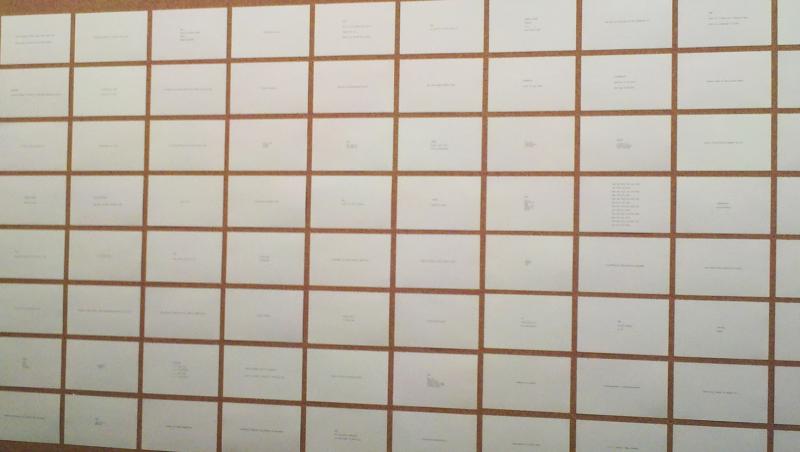 |
| George Brecht performs "Incidental Music" in 1961. |
We've read Susan Sontag's thoughts on the (then-)burgeoning artform known as "happenings," have seen some pieces from Jackson Mac Low and Hannah Weiner that embody their spirit, and have acquainted ourselves with the aesthetic philosophies of one of their major influences, John Cage. Today, we'll spend some time looking at a selection of pieces from George Brecht and Yoko Ono, two key members of the Fluxus movement, an international Neo-Dadaist collective that came to prominence in the 1960s.
 |
| Two event scores by George Brecht. |
First, the master of the event score, George Brecht, whose ambitious hybrid pieces found connections between poetry, music, choreography, and drama, and frequently demonstrated a subversive sense of humor. You can read through a collection of many of Brecht's pieces here, and even see variations between different performances in different years.
 Next, we'll read selections from Yoko Ono's iconic book Grapefruit. First published in 1964, the book received more mainstream attention after a 1970 edition featuring an introduction by Ono's husband, John Lennon — "Hi! My name is John Lennon. I'd like you to meet Yoko Ono..." — and the surrealistic performance instructions contained therein fit nicely with the couple's "bagism" ethos, and even, in a way, the rhetoric behind their "War is Over! (if you want it)" billboard campaign.
Next, we'll read selections from Yoko Ono's iconic book Grapefruit. First published in 1964, the book received more mainstream attention after a 1970 edition featuring an introduction by Ono's husband, John Lennon — "Hi! My name is John Lennon. I'd like you to meet Yoko Ono..." — and the surrealistic performance instructions contained therein fit nicely with the couple's "bagism" ethos, and even, in a way, the rhetoric behind their "War is Over! (if you want it)" billboard campaign.In Grapefruit, Ono creates hybrid aesthetic constructs similar to Brecht's, with performance scores that create paintings, films, music, and personal meditative acts. You can read selections from Grapefruit here: [PDF]. Acorn, a sequel of sorts to Grapefruit, was published in 2013; you can read a few excerpts from it here.
Next, we'll shift gears a little bit, to look at two imaginative texts that demand an interactive performance from their readers. First, Robert Grenier's Sentences (1978), originally produced as a boxed version of 500 individual cards, which can be read in any order. You can browse a virtual version of the text, which will randomly and reductively select cards from the deck until all options are exhausted, here (read as much or as little as you'd like). Photos of the original version can be found here.
 |
| Cards from Grenier's Sentences on display in a gallery in Brooklyn, May 2013. |
Another iconic conceptual poetic text which demands a sort of performance from its readers is Richard Brautigan's Please Plant This Book, first published in the spring of 1968 as a folder containing eight seed packets, each with a poem printed on the outside. Like the Grenier, it's been lovingly resurrected in a virtual version here, however the seeds aren't included. Nonetheless, try to imagine the experience of the original, whereby the reader completes the act of reading each poem by planting the seeds, and thereafter the poem continues, in a sense, as the plant, flower, or vegetable that comes forth. In "Lettuce," Brautigan muses that "The only hope we have is our / children and the seeds we give them / and the gardens we plan together," and that figurative wisdom becomes literal with a strange and wonderful hybrid text like Please Plant This Book.


No comments:
Post a Comment